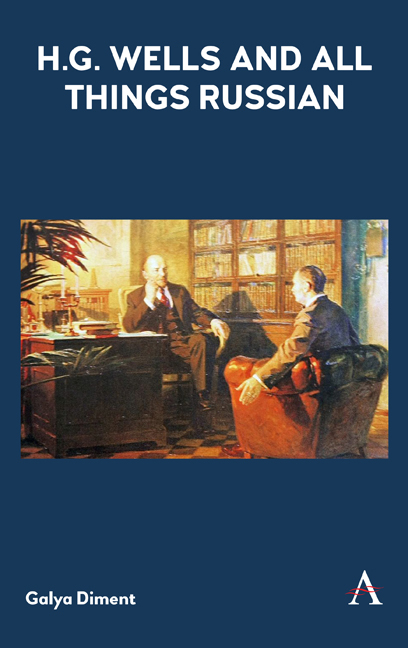Book contents
- Frontmatter
- Dedication
- Contents
- List of Illustrations
- Acknowledgments
- List of Contributors
- A Note on Transliteration
- Introduction: “The Wells Effect”
- Part One WELLS IN RUSSIA: PRE-WORLD WAR II
- Part Two WELLS IN RUSSIA: POST-WORLD WAR II
- Chapter Four “Unregenerate Mass Nature” in H. G. Wells and the Brothers Strugatsky
- Chapter Five Culturology: Yuly Kagarlitsky's Life of Wells
- Chapter Six “Come and Visit Us in Ten Years’ Time!”: Representation of H. G. Wells on the Russian Stage and Screen
- Part Three RUSSIA IN WELLS
- APPENDIX TRANSLATIONS
- Bibliography
- Wells, Herbert George – Works Index
- General Index
Chapter Five - Culturology: Yuly Kagarlitsky's Life of Wells
from Part Two - WELLS IN RUSSIA: POST-WORLD WAR II
Published online by Cambridge University Press: 06 September 2019
- Frontmatter
- Dedication
- Contents
- List of Illustrations
- Acknowledgments
- List of Contributors
- A Note on Transliteration
- Introduction: “The Wells Effect”
- Part One WELLS IN RUSSIA: PRE-WORLD WAR II
- Part Two WELLS IN RUSSIA: POST-WORLD WAR II
- Chapter Four “Unregenerate Mass Nature” in H. G. Wells and the Brothers Strugatsky
- Chapter Five Culturology: Yuly Kagarlitsky's Life of Wells
- Chapter Six “Come and Visit Us in Ten Years’ Time!”: Representation of H. G. Wells on the Russian Stage and Screen
- Part Three RUSSIA IN WELLS
- APPENDIX TRANSLATIONS
- Bibliography
- Wells, Herbert George – Works Index
- General Index
Summary
As I have gone through the always reverent, often critical, sometimes naïve pages, it has occurred to me how much H. G. would have approved of the author, with his determination, intelligence, and courage. […] H. G. would have been delighted to read this painstaking, if controversial study of his work. I am only sad that he is not here to launch into a violent discussion on the conflicts and contradictions that undoubtedly existed.
— Moura Budberg, Foreword to J. Kagarlitski, The Life and Thought of H. G. Wells (1966)Published to coincide with the centenary of Wells's birth, Moura Budberg's translation of Herbert Wells (Moscow, 1963) by Yuly Kagarlitsky – or Julius Kagarliski, in her version – was greeted by one of its British reviewers as a ‘sign of the times’ reflecting the climate of destalinization and (short-lived) ideological rapprochement in the Cold War. The reviewer, Maurice Richardson, concluded that ‘You can learn a lot from this book’, and I believe that this is still true today. Kagarlitsky (1926– 2000), who wrote as an undoctrinaire Marxist, was then a senior lecturer at the Moscow State Institute of Theatrical Art, from which he would be dismissed in 1984 as a result of the dissident activities of his son Boris. Just how deep his Marxist convictions were in the 1960s is not for me to say; although he and I had been in correspondence since the 1970s, I did not actually meet him until 1987 when, as he clearly sensed, the Soviet experiment was almost at its end. But his own account of his book in the ‘Author's Preface’ is sufficiently arresting:
It isn't written by an exponent of ‘points of view’, but by an individual, a man who has written for almost twenty years about literature and the theatre, a husband and a father, who has lived almost permanently in Moscow, the Moscow of 1948, ‘53, ‘56, ‘64 – in other words a real man, a citizen who, like millions of others, has happened to meditate on life, on men, on the times we live in […] I have already mentioned that one of the people who have most helped my understanding of life was Wells. Alongside this, life's experience and my belief in the rightness of Marxism has helped me to form my own opinion of Wells.
- Type
- Chapter
- Information
- H. G. Wells and All Things Russian , pp. 101 - 112Publisher: Anthem PressPrint publication year: 2019



